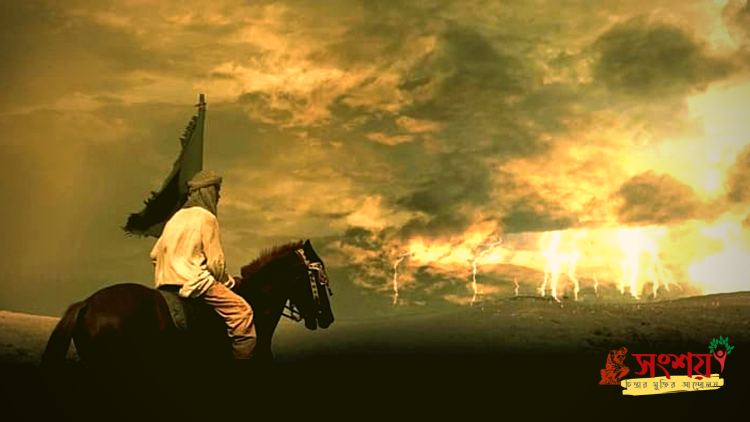Was Prophet Muhammad the greatest man of all time?
Table of Contents
Introduction
As a child, I used to hear a very wonderful human story from my mother’s mouth. The story was about the Holy Prophet Muhammad (PBUH) and a Jewish old woman. A Jewish old woman used to lay a thorn in the path of the Holy Prophet’s prayer every day. While the Holy Prophet was prostrating, she would put camel guts on his back, torturing him in various ways and hurling inaudible abuses. But the humane, the greatest human being in the universe—our Prophet—never said anything to that old woman. He would pray to Allah without protest, praying that Allah would guide the Jewish old woman to the right path and grant her the knowledge of guidance.
One day something surprising happened. The Holy Prophet saw that there was no thorn in his path that day. No one was abusing him, no one was throwing camel or sheep offal on his back. He was surprised! After finishing prayer, he ran to the old woman’s house. He arrived to find that the old woman was sick. Thereafter, the compassionate Holy Prophet served the woman with his own hands and nursed her lovingly. Seeing this humane kindness of the Holy Prophet, the Jewish old woman realized her mistake and was ashamed. Later she accepted Islam and devoted her life to the service of the religion.
The story is truly amazing. When I used to listen to it as a child, tears would well up in my eyes with emotion. Ah, our Prophet was such a good person. He loved everyone equally regardless of religion or caste. Such people are what the world needs. That is why I loved the Holy Prophet very much in my childhood. My mother used to tell me many more such stories about the Holy Prophet. I was impressed by those stories and thought I would be compassionate like the Prophet. If someone abused me, insulted me, or even hurt me, I would respond with love. I would never harm them. With this thought in mind, I used to hum:
Nabi mor poroshmoni, Nabi mor gold mine,
Whoever chants the name of Nabi, he is the rich of do jahan.
After growing up, I started reading the Qur’an to know these stories in more detail. Naturally, I believed that the Qur’an and Hadith would be full of such historically truthful incidents. But I searched all of the Qur’an and hadiths. I couldn’t find anything like this anywhere. I’d be very happy if it were actually the case. I felt very good about the way I knew Prophet Muhammad as a child. Let’s listen to this waz (sermon),
The Holy Prophet left the religion of his forefathers. He did not stop at that; he regularly criticized those religions. Naturally, the pagan unbelievers were enraged by this. Even today, if a Muslim abandons his religion and becomes a Hindu or an atheist, it is very difficult for him to live in a Muslim society. Surely the Holy Prophet Muhammad was treated similarly in his time. However, how did he treat his own apostates? Did he conquer them with love, or punish them?
It became very important for me to find out how the Holy Prophet actually treated his critics and slanderers according to the Qur’an, Hadith, and other Islamic history. But to my surprise, by looking into the hadith books I discovered a completely different Muhammad! I am presenting accounts of that different Muhammad here. The text will be quite long, but I hope readers will read it carefully to the end.
I am always very conscious about choosing friends. Friendship with someone means talking to them, standing by them in times of danger, sharing happiness and sadness. So I choose friends very consciously, avoiding people whose mindset does not align with mine. When I get to know someone, I consider three things first to judge what kind of person he is:
- Is he a religious sectarian? Does he hate people of different religions?
- How is his attitude towards women and third-gender people? Does he consider women to be of a lower level than men?
- How is his attitude towards the minority communities and marginalized people of the country like Hindus, Buddhists, Christians, Adivasis, non-Bengalis?
After considering these three factors, I usually conclude whether someone is a good person or a bad person. Whether I should associate with, befriend, or even talk to such people depends mostly on these things. But it doesn’t end there. Even then, I observe if he is corrupt, if he oppresses the weak, and especially how he behaves with the boys and girls of his household. If I see any of these negative traits, then my friendship with that person does not last. I slowly try to avoid him and lose interest in maintaining a relationship with him. However, it is not only these few things that we consider. There are many other things I keep in mind.
I think it is very important to analyze people’s character. Even among my relatives, if I find someone with such tendencies, I am not comfortable maintaining a relationship or socializing with him. We must consider these things when choosing someone as a friend or close associate. Otherwise I would be lowering myself. But if you want to consider someone as the greatest person in the world, you must keep many more things in mind. More analysis will be needed—because common people tend to follow those held up as great. If the wrong person is given the place of greatest person, common people will follow him blindly, thereby adopting that person’s characteristics.
Prophet Muhammad is often claimed to be the greatest human of all time. But what qualities do we expect in a truly good person? Such a person would not commit murder, would not rape, would not loot the property of others, would not force anyone to do anything against their will, would not harbor sectarian thoughts, would show respect for women and be conscious about gender equality, and would treat minorities or people of other faiths as equals. Judging by these qualities, can we truly call Muhammad not just the greatest human of all time, but even a good person at all?
The Narcissist Prophet
Narcissistic Personality Disorder is a pervasive and long-term tendency in which a person’s behavior or thinking is marked by an intense need for admiration from others. Almost everyone affected by this disorder believes they are more important than those around them, that they are uniquely created, or that they deserve special treatment. If others do not give them this attention, they become irritated and may even behave aggressively. When children grow up without much attention or validation, they often try extra hard to earn the praise or recognition of others. In fact, most children have a natural tendency to seek attention, but in those with this disorder, the behavior persists over time. As they grow up, this can develop into narcissism. Those suffering from Narcissistic Personality Disorder often display arrogance and contempt toward others. They frequently engage in various manipulations or deceptions to appear important to certain people, are always trying to control those around them, and, when they fail to do so, become angry and start cursing those they cannot control.
People with this disorder can be described as “narcissists” or as suffering from “narcissism.” Sometimes, they may even develop a Messiah complex—a state of mind in which a person believes that now or in the near future, they will become a savior for all, and that ordinary people should accept this and treat them as a king, leader, or the most important person.
The Prophet commanded to love himself
Prophet Muhammad of Islam instructed his ummah to love him. A true believer must love the Prophet more than his own parents—otherwise he is not a believer. If anyone other than the Prophet had said that one should love the Prophet this much, there would be no objection. But here the Prophet himself is ordering people to love him, which is rather ridiculous. It is like a movie general, a dictator like Aladdin’s genie or a military ruler, forcing his followers to love and respect him. Normally, love is earned by one’s actions, not demanded at sword-point. There was a Bengali movie titled “Tell me if you give love!” [1]
Sahih Bukhari (Tawheed)
Chapter: 2/ Faith (Iman)
Section: 2/8. Loving the Messenger of Allah, may God bless him and grant him peace, is part of faith.
14. Narrated from Abu Hurairah (RA): The Messenger of Allah (ﷺ) said: “By Allah, in whose hand is my life, none of you can be a true believer until I amdearer to him than his father and children.” (Modern Publications: 13, Islamic Foundation: 13)
The standard of Hadith: Sahih (Authentic)
Narrator: Abu Huraira (RA)
The Prophet was full of praise for himself
Prophet Muhammad had a tendency toward self-praise and to present himself as superior to his Companions. A leader is usually humble and refrains from boasting of his own qualities. However, if someone claims his own superiority, it raises questions about his true greatness. According to the basic teachings of Islam, Prophet Muhammad was humble, patient, and an ideal example for all. However, various hadith narrations show that he often presented himself as the best among the Companions and was pleased by others’ praise of him. Such behavior in an ideal leader fosters a tyrannical disposition—craving flattery and unable to accept criticism [2].
Sunan At-Tirmidhi (Tahqiqi)
Chapter: 46/ The Virtues of the Messenger of Allah ﷺ and His Companions
Section: 64. The virtues of the Prophet’s wives
3895. Narrated Aisha (RA): She said, The Messenger of Allah (ﷺ) said: “The best of you is the one who is best to his family, and I am the best among youto my family. And if any of your companions dies, then refrain from criticizing him.”
Sahih (Authentic) – Hadith No. 285 (Abu Isa said: this hadith is Hasan Gharib Sahih as narrated from Sufyan al-Thawri; very few people narrated it from Hisham ibn Urwah – from his father – from the Prophet (ﷺ) in mursal form.)
Hadith grade: Sahih (Authentic)
Narrator: Aisha (RA)
[Another translation:] Aisha narrated that the Messenger of Allah (ﷺ) said: “The best of you is the best to his wives, and I am the best of you to my wives.” …
Read the English translation of the above hadith. The truth is, as a result of quarrels with his wives over his maidservant, the Prophet would even invoke divine revelation to threaten his wives [3]. You can read the details on this subject in another article [4].
“If the Prophet were to divorce all of you, perhaps his Lord would give him wives better than you — submissive, faithful, obedient, repentant, devout, fasting, previously married and virgins.”
— Taysirul Quran
“If the Prophet abandons all of you, his Lord will probably give him wives better than you, who will be submissive, faithful, obedient, repentant, devout, observant of fasting, previously married and virgins.”
— Sheikh Mujibur Rahman (Bangla translation)
[Qur’an 66:5]
The Prophet Cursed Those Who Did Not Send Salawat (Darood) Upon Him
Prophet Muhammad would curse those who did not recite blessings (salawat or darood) for him, and wished harm upon them.
Reference:
Riyad-us-Saliheen
Chapter 15: On Sending Blessings and Peace Upon the Messenger of Allah ﷺ
Section 243: The Command, Virtue, and Formulas of Sending Blessings and Peace Upon the Prophet ﷺ
Hadith (4/1408):
Narrated by Abu Huraira (RA): The Messenger of Allah ﷺ said,
“May the nose of that person be rubbed in dust (i.e., may he be humiliated) who hears my name mentioned and does not send blessings upon me.”
(In other words, does not say ‘Sallallahu Alaihi Wasallam’ after hearing my name.)
(Reported by Tirmidhi, graded Hasan. See also: Ahmad 7402.)
Hadith status: Hasan (authentic and reliable)
The Prophet committed contradictory acts
The Prophet had prevented Ali from marrying his second
Prophet Muhammad himself married multiple women and also kept slave women as concubines. His wives frequently quarreled about these other women—so much so that Allah supposedly revealed verses (even threatening them) to resolve the disputes. The presence of more than one wife in a family often creates conflict; in Muhammad’s case, the Qur’an contains verses where Allah scolds the Prophet’s wives for their behavior. It is well known that Prophet Muhammad loved his young wife Aisha the most. Interestingly, even though he himself married many times, he did not allow his own son-in-law to take another wife. In this instance, he acted like an outraged father: “How could my daughter have a co-wife!” But he forgot that the women he married were also someone else’s daughters. Nor did he consider that they too suffered when they entered a household as co-wives [5] [6].
Sahih Bukhari (Islamic Foundation)
Chapter: 54/ Marriage
Hadith: 4850. Narrated Miswar Ibn Makhrama (RA): I heard the Messenger of Allah (ﷺ), while he was on the pulpit, say: “Banu Hisham ibn Mughirah have asked my permission for Ali ibn Abi Talib to marry their daughter. But I do not allow it, I do not allow it, I do not allow it! Not unless Ali ibn Abi Talib divorces my daughter (Fatima); only then he may marry their daughter. For, Fatima is a part of me, and whoever upsets her upsets me, and whatever harms her harms me.”
Hadith grade: Sahih (Authentic)
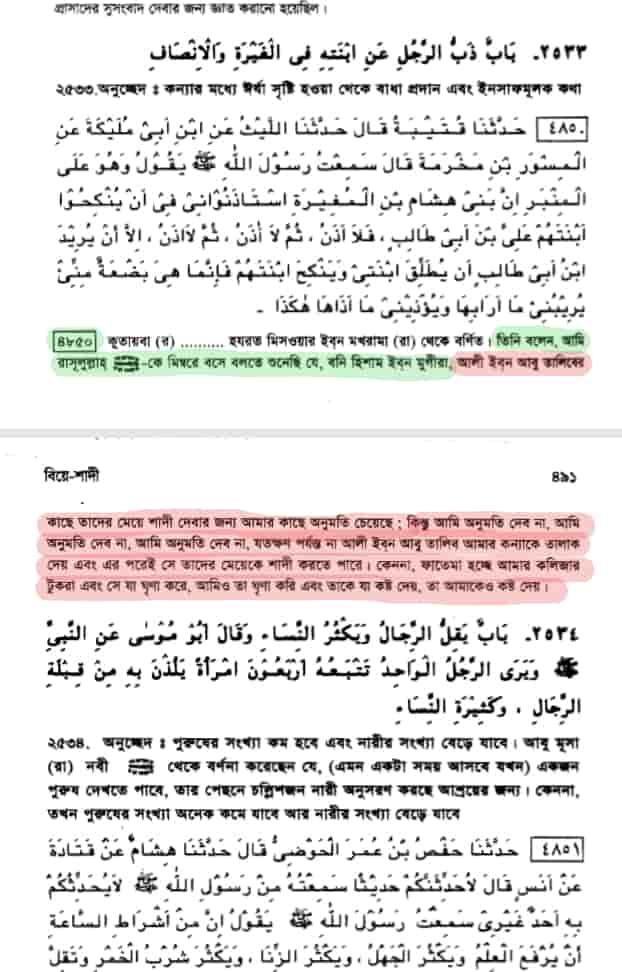
It is further confirmed that Ali himself intended to pursue this marriage, as found in the commentary of Bukhari Sharif [7] –
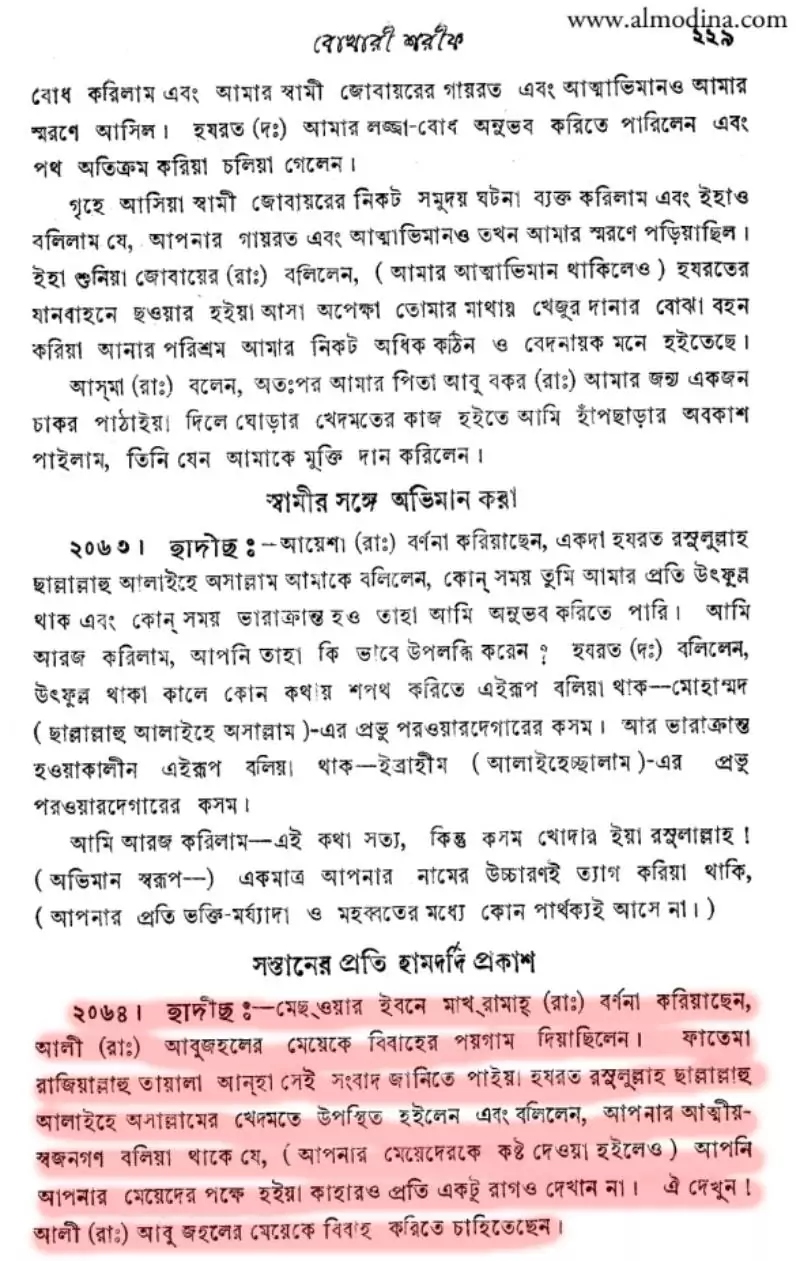
Now let’s see another hadith collection to verify that Ali was indeed willing to take a second wife [8] –
Al-Lu’lu’ wal Marjan
Chapter: The Virtues of the Companions
Section: The Virtues of Fatima bint Muhammad (ﷺ)
Hadith: 1592. Narrated Miswar Ibn Makhrama (RA): He said, Ali (RA) sent a marriage proposal for the daughter of Abu Jahl. When Fatimah (RA) heard this news, she went to the Messenger of Allah (ﷺ) and said, “People are saying that you do not care about the honor of your daughters. Ali (RA) is going to marry the daughter of Abu Jahl.” The Messenger of Allah (ﷺ) prepared to deliver a sermon. (Miswar said) When he praised and glorified Allah, I heard him say: “I married my daughter (Fatima) to Abu al-As ibn al-Rabi’. He spoke to me truthfully (i.e., kept his promise). Fatima is a part of me; I do not want her to be troubled. By Allah, the daughter of the Messenger of Allah and the daughter of the enemy of Allah will not be united under one man.” Thereupon Ali (RA) abandoned his marriage proposal.
(Referenced in Bukhari, Hadith 3729; Muslim, Hadith 2449)
Hadith grade: Sahih (Authentic)
Narrator: Miswar ibn Makhrama (RA)
In summary, the Prophet himself had multiple wives and concubines, yet he vehemently forbade his son-in-law Ali from taking another wife, to spare his daughter’s feelings. He did not seem to recognize that the many women he married were likewise daughters of someone, who also felt pain at becoming co-wives. This double standard highlights a contradiction in the Prophet’s actions versus what he expected of others.
The Prophet had intercourse without a dowry
We all know that Prophet Muhammad engaged in sexual relations outside of marriage, such as with his maidservant (Maria). But that was not the only instance; apart from her, he also had intercourse with other women without offering them any formal dowry (mahr). Evidence of this is found in Tafsir Ibn Kathir’s commentary on verses 50–51 of Surah Al-Ahzab. Even Aisha, one of Muhammad’s wives, was upset at this behavior. She even remarked that these revelations conveniently suited Muhammad’s desires! [9]
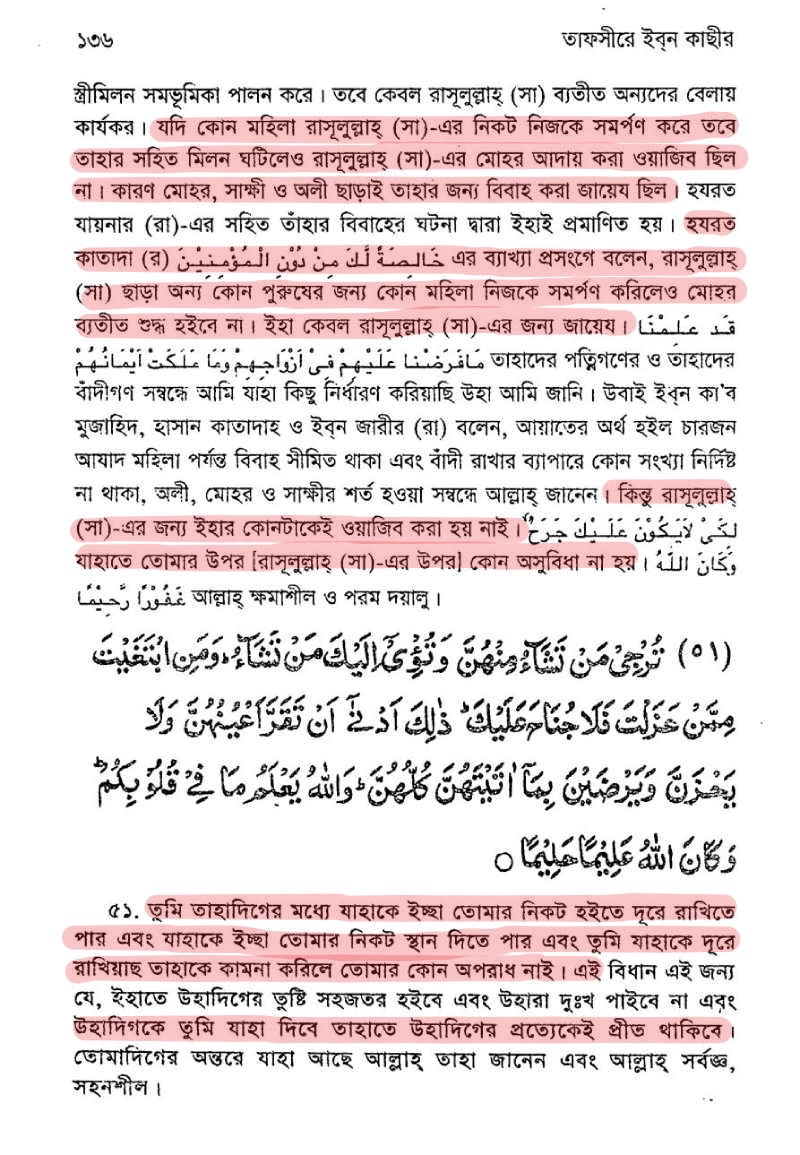
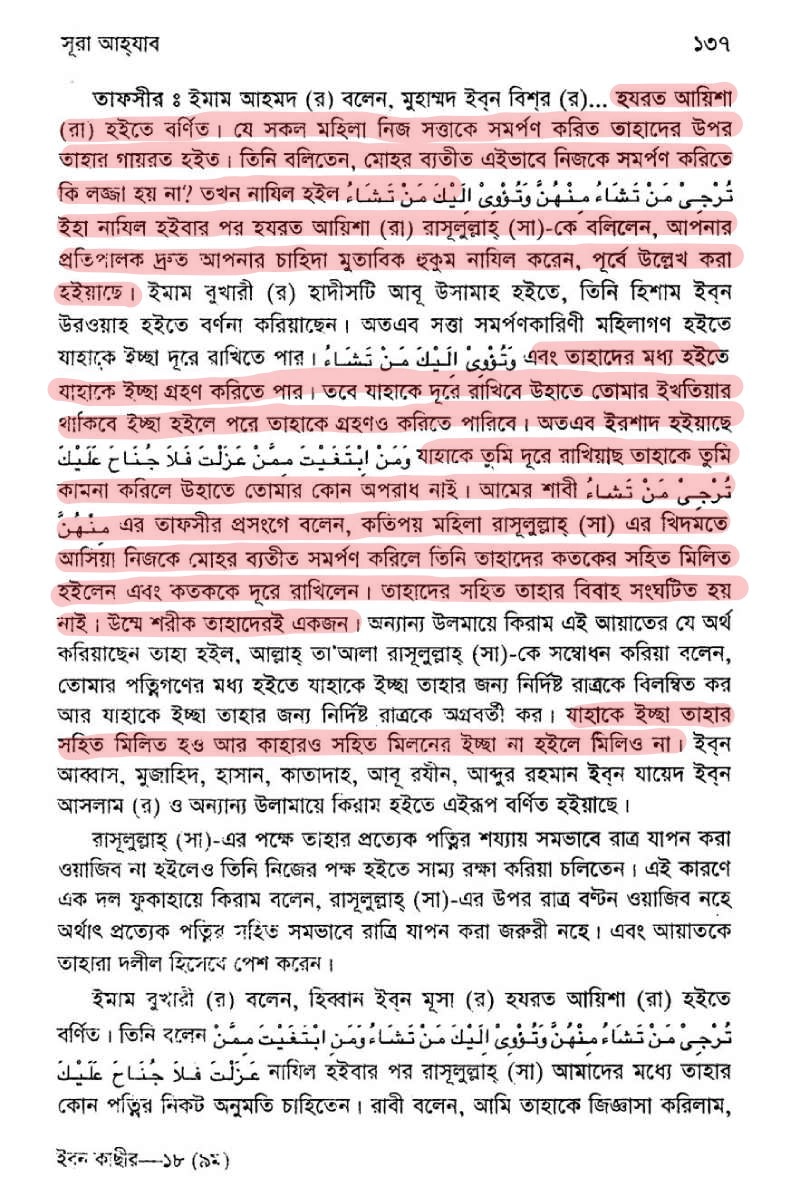
The Prophet urinated facing the Qibla
After forbidding others from urinating while facing the Qibla, the Prophet himself was later seen urinating in that direction. [10]
Sunan At-Tirmidhi (Tahqiqi)
Chapter: 1/ Purification
Section: 7. Concessions mentioned (regarding these matters)
9. Narrated Jabir ibn Abdullah (RA): He said, The Prophet (ﷺ) forbade defecating or urinating while facing the Qibla. But one year before his death, I saw him relieving himself facing the Qibla. – (Hadith grade: Sahih) Ibn Majah – Hadith 325.
This chapter also contains hadiths narrated from Abu Qatada, Aisha, and Ammar (RA). Abu Isa (Tirmidhi) said: Jabir’s hadith in this chapter is Hasan Gharib.
Hadith grade: Sahih (Authentic)
Narrator: Jabir ibn Abdullah al-Ansari (RA)
Prophet Muhammad urinated standing
According to a famous hadith, Prophet Muhammad urinated while standing, despite strictly prohibiting doing so. Although believers offer various interpretations for why he did this, the hadith is clear. [11]
Mishkatul Masabih (Mishkat)
Chapter: Book 3 – Purification
Section: Etiquette of toilet and urination
364-(31) Narrated Hudhaifa (RA): The Prophet (ﷺ) came to a garbage dump of a certain tribe and stood and urinated there. (Reported in Bukhari and Muslim.)
(Commentary: It is said the Prophet only did this for a specific reason.)
Hadith grade: Sahih (Authentic)
The Prophet was a foodie
Many Muslims today claim that the Prophet ate very little and advised others to do the same – that eating sparingly is a Sunnah of the Prophet. But authentic hadiths tell a different story. They clearly show that the Prophet was extremely fond of food. In the hadiths below, we see that the Prophet would ask for more even after eating two forelegs of a goat. Consider: how many kilograms of meat are on the front legs of a medium-sized goat? How could someone ask for more after finishing two of them? [12] [13] –
Sahih Shamā’il Tirmidhi
Chapter 26: Description of the Prophet’s curry (food)
Hadith: 126. Narrated Abu Ubayd (RA): He said, I once cooked a pot of meat for the Prophet (ﷺ). He especially liked the foreleg of the goat, so I gave him a front leg. Then he said, “Give me another front leg.” So I gave him another. Then he said again, “Give me another front leg.” I said, O Messenger of Allah, how many front legs does a goat have? (i.e., a goat has only two!) He said, “By the One in whose hand is my life, if you had kept quiet, you could have kept giving me front legs as long as I desired.”[1]
[1] (References: al-Tabarani’s al-Mu’jam al-Kabir, Hadith 18286; Musnad al-Bazzar, Hadith 8345.)
Hadith grade: Sahih (Authentic)
Sunan Ad-Dārimi
Chapter: Virtues
Section: Blessings bestowed in food for the Prophet (ﷺ)
Hadith: 45. Narrated Shahr ibn Hawshab from Abu Ubayd (RA): He cooked a pot of meat for the Messenger of Allah (ﷺ). The Messenger of Allah (ﷺ) said to him, “Give me a foreleg.” He loved the foreleg, so it was given to him. He said again: “Give me the foreleg.” So it was given to him. He said again: “Give me the foreleg.” Then I said to him, “O Messenger of Allah! How many forelegs can a goat have?” He replied: “By the One in whose hand is my life, if you had remained silent you could have continued to give me forelegs as long as I wanted.”[1]
[1] (Hadith grade: Hasan, due to the presence of Shahr ibn Hawshab – Tabarani, Al-Mu’jam al-Kabir 22/335 no. 842; Tirmidhi, Shamā’il 170.)
Hadith grade: Hasan (Reliable)
According to the book Al-Bidaya wa’n-Nihaya, the Jews used to mock the Prophet’s excessive greed for food and women, saying: “This man is never satisfied with food; this man knows nothing except women.” [14] –
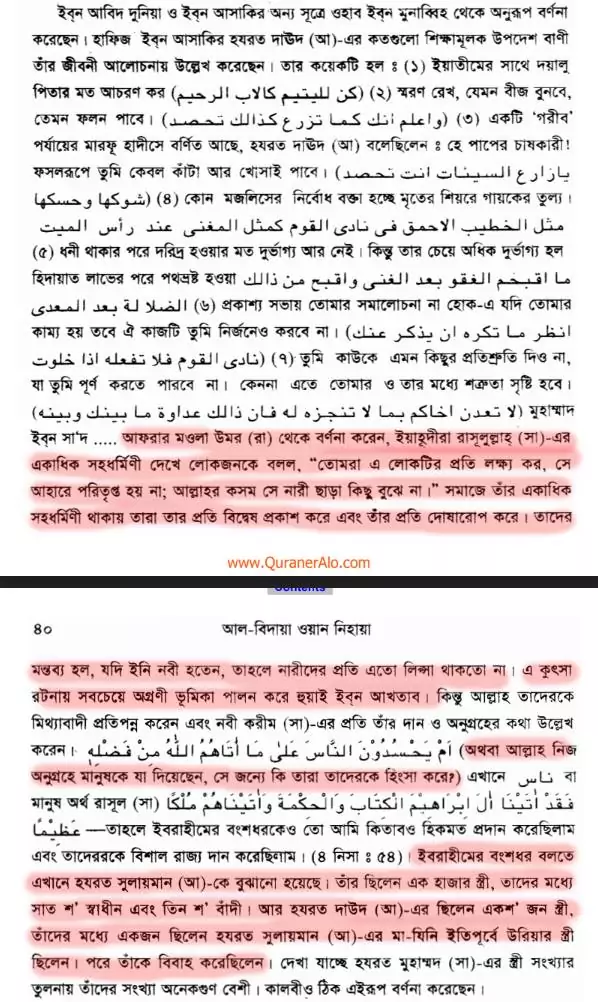
The Prophet was afraid of death
According to Sahih hadiths, even though Prophet Muhammad had full faith and trust in Allah—and despite mighty angels like Gabriel and thousands of others supposedly accompanying him—he could not sleep at night for fear of his enemies. He would be as alert as a guard, afraid that someone might come and kill him. [15]
Sahih Bukhari (Tawheed)
Chapter: 56/ Jihad and wartime rituals
Section: 56/70. Being on guard in the path of Almighty Allah.
Hadith: 2885. Narrated Aisha (RA): She said, (One night) the Messenger of Allah (ﷺ) stayed awake (unable to sleep). When he arrived in Medina, he said, “If only some righteous man from among my companions would guard me tonight.” At that moment we heard the sound of weapons. He asked, “Who is that?” The person said, “It is Sa’d ibn Abi Waqqas. I have come to stand guard for you.” Then the Prophet (ﷺ) slept (peacefully). (Also in Muslim, Hadith 2410; Ahmad 25147)
Hadith grade: Sahih (Authentic)
Narrator: Aisha (RA)
The Prophet was frightened on the battlefield
Prophet Muhammad, the so-called beloved of Almighty Allah who wielded the greatest power in the universe, would still call for help and panic on the battlefield when he was in danger. One has to wonder: what were all those angels tasked with protecting him doing at that time? This situation calls to mind a local charlatan I knew who claimed to control powerful jinn; he would scare people and extort money by boasting that his jinn could carry anyone away or perform great feats. One day, some neighborhood boys set dogs after him. The fraud ran so fast he could have won an Olympic gold medal—his loincloth even fell off as he fled. Needless to say, his “powerful” jinn were nowhere to be seen that day! [16]
Sahih Muslim (Islamic Foundation)
Chapter: 33/ Jihad and its rules
Section: 37. The Battle of Uhud
Hadith: 4490. Narrated Anas Ibn Malik (RA): On the day of the Battle of Uhud, only seven Ansar and two Muhajir (Quraysh) companions remained with the Messenger of Allah (ﷺ). (When the enemy) surrounded him, he said, “Whoever repels them from us will be my companion in Paradise.” One of the Ansar advanced, fought, and was martyred. The enemy encircled him again and he repeated (the challenge). All seven Ansar were martyred in this manner. Then the Messenger of Allah (ﷺ) said regarding his fallen companions: “We have not done justice to them” (meaning, “We survived while they were martyred”).
Hadith grade: Sahih (Authentic)
Narrator: Anas Ibn Malik (RA)
The Prophet made a wrong prediction
Prophet Muhammad made several prophecies that turned out to be wrong. Even during the time of the Caliphs, one of Muhammad’s predictions was proven false. Later, Islamic scholars tried to explain away those hadiths with all sorts of interpretations. They twisted words and contexts, but any intelligent person can understand what really happened. Let’s look at some examples of these failed prophecies.
The pandemic entered Medina
Prophet Muhammad declared that the city of Medina would never be entered by an epidemic or plague [17] [18] –
Sahih Bukhari (Islamic Foundation)
Chapter: 63/ Medicine
Section: 2301. Description of plague.
Hadith: 5320. Narrated Abu Huraira (RA): He said, The Messenger of Allah (ﷺ) said: “The Messiah al-Dajjal will not be able to enter Medina, and (similarly) no plague will enter it.”
Hadith grade: Sahih (Authentic)
Narrator: Abu Huraira (RA)
Sahih Bukhari (Islamic Foundation)
Chapter: 86/ Refutation of Jahmiyyah and Affirming Tawheed
Section: … (context of various Qur’anic verses about Allah’s Will).
Hadith: 6965. Narrated Anas ibn Malik (RA): He said, The Messenger of Allah (ﷺ) said: “Dajjal will come to Medina, but when he sees the angels guarding Medina, the plague will not be able to enter Medina, if Allah wills.”
Hadith grade: Sahih (Authentic)
Narrator: Anas ibn Malik (RA)
Interestingly, plagues have struck Medina numerous times in history. The city of Medina was even closed during the recent Coronavirus pandemic. In fact, as the next hadith shows, a plague spread in Medina during the time of Umar. Note that in the hadith, Umar is addressed as “Amir al-Mu’minin,” indicating it occurred during his caliphate [19] –
Sahih Bukhari (Islamic Foundation)
Chapter: 44/ Testimonies
Section: 1647. Some people’s testimonies can establish integrity.
Hadith: 2467. Narrated Abul Aswad (RA): He said, I came to Medina when it was afflicted by an epidemic that was killing a large number of people. I was sitting near Umar (RA). A funeral passed by and people spoke well of the deceased. Hearing that, Umar said, “It has become obligatory.” Then another funeral passed and people also spoke well of the deceased. Umar said, “It has become obligatory.” Then a third funeral passed and people spoke ill of the deceased. He said, “It has become obligatory.” I (Abul Aswad) asked, “What has become obligatory, O Amir al-Mu’minin?” He said, “I said what the Prophet (ﷺ) said: ‘If four people testify to the goodness of a Muslim, Allah will admit him to Paradise.’ We asked, ‘And if three people do so?’ He said, ‘Even three.’ We asked, ‘And if two?’ He said, ‘Even two.’ We did not ask about one.”
Hadith grade: Sahih (Authentic)
Narrator: Abul Aswad (RA)
When will Doomsday be?
From various hadiths, it is evident that Prophet Muhammad indicated Doomsday was very near. He said, “Doomsday is very near” [20] and even pointed to a boy and said that the Final Hour would come before that boy grew old. But that boy died long ago, yet no Day of Judgment has arrived [21] –
Sahih Muslim (Islamic Foundation)
Chapter: 55/ Signs of Turmoil and the End Times
Section: 23. About Doomsday
Hadith: 7140. Narrated Anas (RA) via Abu Ghassan Misma’i (RA): The Messenger of Allah (ﷺ) said: “I and the Last Hour have been sent like these two,” and Rabi (the sub-narrator) said: at that time he held together his index and middle fingers (to illustrate closeness).
Sahih Muslim (Islamic Foundation)
Chapter: 55/ Signs of Turmoil and the End Times
Section: 23. About Doomsday
Hadith: 7142. Narrated Anas (RA) via Abu Bakr ibn Abu Shaybah and Amr an-Naqid (RA): He said, once a man asked the Messenger of Allah (ﷺ) about the Last Hour. An Ansari boy named Muhammad was present. The Messenger of Allah (ﷺ) said: “If this boy lives, the Hour will arrive before he grows old.”
Hadith grade: Sahih (Authentic)
Narrator: Anas ibn Malik (RA)
The Prophet spoke without adequate knowledge
Prophet Muhammad had a habit of giving opinions even on matters he did not know about. As a result, his Companions sometimes realized that what he said was incorrect. In such cases, the Prophet would then attempt to spin or amend his earlier statements. One example of this lack of knowledge is the hadith about where the sun goes at night (which is not included here as it is discussed elsewhere). Let’s consider some other hadiths that illustrate how, despite the Prophet’s limited knowledge on certain subjects, he still spoke as if he were knowledgeable. In the following accounts, the Prophet instructs his Companions in ways that ultimately proved him wrong—demonstrating that he was only human and could make mistakes. But that raises the question: how could someone believed to possess infinite knowledge commit such errors? And why give authoritative opinions on matters he truly did not understand? [22] [23] –
Sahih Muslim (Islamic Foundation)
Chapter: 45/ Virtues
Section: 34. It is obligatory to follow what the Messenger of Allah (ﷺ) establishes as Shari’ah; it does not apply to his personal opinions in worldly matters.
Hadith: 5915. Narrated Rafi’ ibn Khadij (RA): The Messenger of Allah (ﷺ) came to Madinah. The people were pollinating the date palm trees (by hand). He said, “What are you doing?” They replied, “We have always done it this way.” He said, “Maybe it would be better if you didn’t do that.” So they stopped doing it, and the yields declined or the dates shriveled. When they informed the Prophet (ﷺ) of this, he said, “I am only human. If I tell you something about your worldly affairs, you know better about them. But if I tell you something as part of your religion, then follow it.” (Or words to that effect.)
Hadith grade: Sahih (Authentic)
Narrator: Rafi’ ibn Khadij (RA)
Sahih Muslim (Islamic Foundation)
Chapter: 45/ Virtues
Section: 34. It is obligatory to follow what the Messenger establishes as Shari’ah; it does not apply to his personal opinions in worldly matters.
Hadith: 5916. Narrated Aisha (RA) and others via Abu Bakr ibn Abu Shaybah and ‘Amr an-Naqid (RA): The Prophet (ﷺ) passed by some people who were pollinating date palms. He said, “If you don’t do it, it might be better.” So they stopped, and the crop failed. Later he said, “Pollinate your palm trees; you know more about worldly matters. As for religious matters, I am the one to tell you.”
Hadith grade: Sahih (Authentic)
Narrator: Aisha bint Abi Bakr and others (RA)
Another hadith relates that a companion’s brother had a stomach ache. The Prophet repeatedly instructed him to drink honey. When it didn’t cure the ailment, the Prophet exclaimed, “Your brother’s stomach lies!” How absurd—an illness cannot lie. In the end, the stomach issue did resolve, but we know that stomach troubles usually improve after a few days anyway [24] –
Sahih Bukhari (Tawheed Publication)
Chapter: 76/ Medicine
Section: 76/4. Treatment with honey (Qur’anic reference: “In it (honey) is a cure for mankind” – Surah An-Nahl: 69).
Hadith: 5684. Narrated Abu Sa’eed al-Khudri (RA): A man came to the Prophet (ﷺ) and said, “My brother has some abdominal trouble.” The Prophet (ﷺ) said, “Make him drink honey.” The man came back and said, “I made him drink honey, but it only worsened the diarrhea.” The Prophet said, “Go and give him honey to drink.” The man went and came back and said, “I did, and it made him worse.” The Prophet then said, “Allah has told the truth, but your brother’s stomach is lying. Give him honey.” So he gave him honey again and he recovered. [Reference: Muslim 39/31, Hadith 2267; Musnad Ahmad 11146 (Modern Pub. 5273, Islamic Foundation 5169)]
Hadith grade: Sahih (Authentic)
Narrator: Abu Sa’eed al-Khudri (RA)
Now let’s look at another hadith where the Prophet claimed that everything that came out of his mouth was true [25] –
Sunan Abu Dawud (Islamic Foundation)
Chapter: 19/ Knowledge (Kitab al-Ilm)
Section: 417. Writing down knowledge.
Hadith: 3607. Narrated Abdullah ibn Amr ibn al-As (RA): He said, I used to write down everything I heard from the Messenger of Allah (ﷺ) in order to preserve it. The Quraish discouraged me, saying: “Do you write down everything while the Messenger of Allah is a human being who sometimes speaks in anger and in pleasure?” So I stopped writing and mentioned it to the Messenger of Allah (ﷺ). The Prophet pointed to his mouth and said, “Write, forby the One in whose hand is my life, nothing comes out of this mouth except the truth.”
Hadith grade: Sahih (Authentic)
Narrator: Abdullah ibn Amr ibn al-As (RA)
Dajjal’s eyes are blind?
The Prophet created a confusion with another prophecy: that the Dajjal (Antichrist) would have one eye. In one narration, a Companion says Dajjal’s right eye is blind, while in another, it’s the left eye. Such inconsistency suggests someone who cannot keep their story straight. I can already predict how believers will try to excuse this: they’ll argue one hadith describes Dajjal from one viewpoint and the other hadith from another viewpoint. But clearly this explanation is absurd. [26] [27] –
Sahih Muslim (Hadith Academy)
Chapter: 54/ Signs of Various Turmoil and the End Times
Section: 20. Description of Dajjal, his characteristics and what will be with him.
Hadith: 7251. Narrated Ibn Umar (RA): The Messenger of Allah (ﷺ) mentioned Dajjal in front of the people and said: “Allah is not one-eyed. But beware, Dajjal’s right eye is blind and looks like a protruding grape.” (Islamic Foundation edition: Hadith 7095, Islamic Center: 7149)
Hadith grade: Sahih (Authentic)
Mishkatul Masabih (Mishkat)
Chapter 27: Turmoil (Fitnah)
Section: Signs of Doomsday and Description of Dajjal
Hadith: 5474. Narrated Hudhayfah (RA): He said, The Messenger of Allah (ﷺ) said: “Dajjal’s left eye is blind, and he has abundant hair. Heaven and Hell will accompany him – but in reality his Hell is Heaven and his Heaven is Hell.” (Referenced in Muslim)
Hadith grade: Sahih (Authentic)
Narrator: Hudhayfah ibn al-Yaman (RA)
Repeated failure to show miracles
15 days to answer three questions
The Quraysh, upon advice from some Jews, asked Muhammad three challenging questions to test his prophethood. Muhammad promised to answer them “tomorrow.” However, fifteen days passed with no answer—Gabriel did not come to him during that period. At such a critical moment, when the unbelievers were questioning and challenging Islam, Gabriel was a no-show. Later, Muhammad gave an excuse that because he had not said “insha’Allah” that day, Allah became angry and thus did not send Gabriel! I have never heard a more absurd excuse. At the very moment of urgent need, God supposedly got angry and withheld revelation—what kind of explanation is that? When Gabriel finally arrived, the “answers” given still did not correctly address the questions (I will discuss those later). First, let’s see why and how revelation was halted for fifteen days. We can only speculate where Muhammad wandered in search of answers to those questions—perhaps consulting Jewish scholars during those fifteen days. [28] –
(From Tafsir Ibn Jarir al-Tabari, via Ikrimah, on the authority of an Egyptian shaykh, narrated by Ibn Abbas): The chiefs of the Quraysh once sent another two men, al-Nadr ibn al-Harith and Uqbah ibn Abi Mu’it, to the Jewish scholars in Medina. They said to the scholars, “Ask them (Muhammad and his followers) about Muhammad and what he says, since the Jews are people of the Book and might know better.” The Jewish scholars said, “Ask him these three questions. If he can answer all three, then he is truly a Prophet; if not, he is an impostor. The questions are: (1) Who were the young men of the past who had a wondrous story? (2) Who is the great traveler who reached the ends of the Earth? (3) What is the soul?” Al-Nadr and Uqbah returned to Mecca and told the Quraysh leaders, “This time we’ll have a definitive test for Muhammad. Ask him these three questions.” Soon, they posed these three questions to the Messenger of Allah (ﷺ) one by one. The Messenger of Allah (ﷺ) replied, “I will tell you the answers tomorrow.” But he did not add “insha’Allah (if Allah wills).” The result was that Gabriel did not appear to him for fifteen days; no revelations came. The Prophet (ﷺ) became very upset, and people started spreading various speculations. Then, after this period, Hazrat Jibraeel (Gabriel) descended with Surah al-Kahf, which contained the answers to their questions — along with a rebuke to the Prophet and a lesson (about saying “insha’Allah”).

Turning the Hill of Safa into a Mountain of Gold
The infidels of Mecca challenged Prophet Muhammad, saying that if he could turn Mount Safa into a mountain of gold before their eyes, they would believe in his prophethood. They demanded a miracle similar to the miracle of Prophet Musa (Moses). But tellingly, Prophet Muhammad could not do it. Instead, he made a shameless excuse to save face. Let’s read the account [29] –
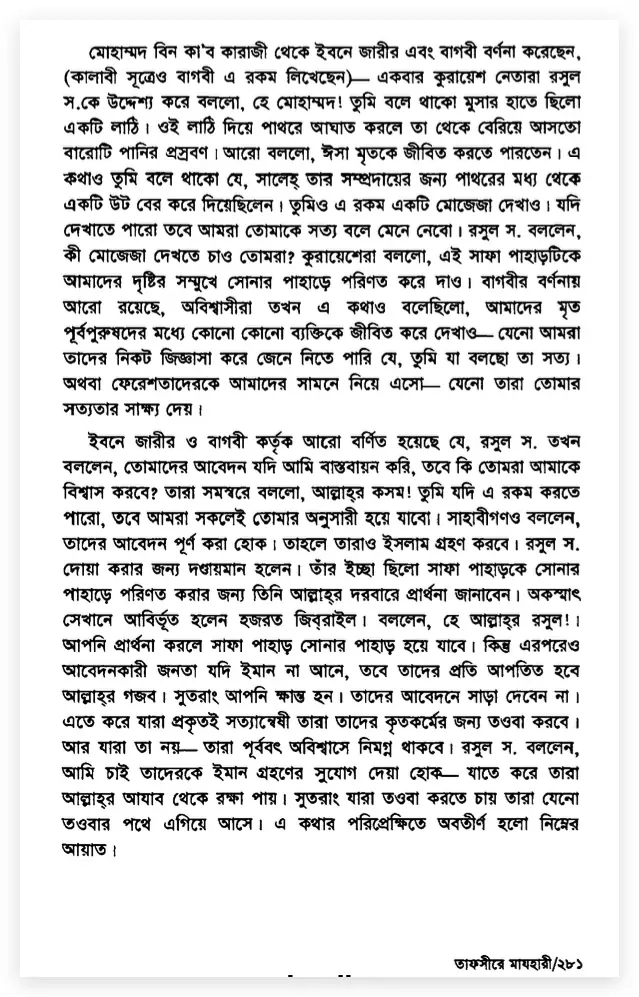
Evading the Banu Nadir Challenge
The chiefs of the Jewish tribe of Banu Nadir once invited Prophet Muhammad and his companions for a discussion, challenging him to provide proof of his prophethood. They said that if Muhammad could answer all the questions posed by their scholars, then the entire tribe of Banu Nadir would accept Islam. Muhammad was to bring 30 companions and the Jews would bring 30 of their scholars. The Prophet went with his companions. But before the debate could begin, he suddenly got up and quietly left, leaving everyone behind. The companions waited a long time, but the Prophet was nowhere to be found. Later they heard from someone that the Prophet had gone back to Medina. When they returned to Medina, they learned that Jibraeel (Gabriel) had supposedly come and told the Prophet in secret that some people were waiting on the rooftop (of the meeting place) to kill him. But why those plotters did not harm the Prophet’s companions, why none of the companions saw anyone on the roof, and why the Prophet slipped away without telling anyone—none of that is explained. In other words, only the Prophet himself “knew” of this secret Jewish plot, for which there is no evidence. Any intelligent person can see how ridiculous this incident was—the Prophet abandoned his friends in a potentially dangerous situation, likely as a strategy to avoid the debate with the Jews. The very next day, Banu Nadir was attacked under Muhammad’s leadership [30] –
(From Sirat Ibn Hisham): The Messenger of Allah (ﷺ) was sitting next to the wall of one of their houses. The Jews said, “Who will go up to the roof and throw a stone down to kill Muhammad and rid us of him?” Amr ibn Jihash stood up and said, “I will do it.” He went up to carry out the deed. The Messenger of Allah (ﷺ) was still sitting there with a group of companions—including Abu Bakr, Umar, and Ali (RA). Then the divine message (warning of their plan) came to the Messenger of Allah (ﷺ). He got up and left for Medina without saying anything to anyone. When he did not return for a long time, the Companions went out searching for him. Seeing a man coming from the direction of Medina, they asked about the Messenger of Allah (ﷺ). The man said, “I saw him entering Medina.” Hearing this, all the Companions returned to Medina and gathered around the Messenger of Allah (ﷺ). He then informed them of the Jews’ treachery.
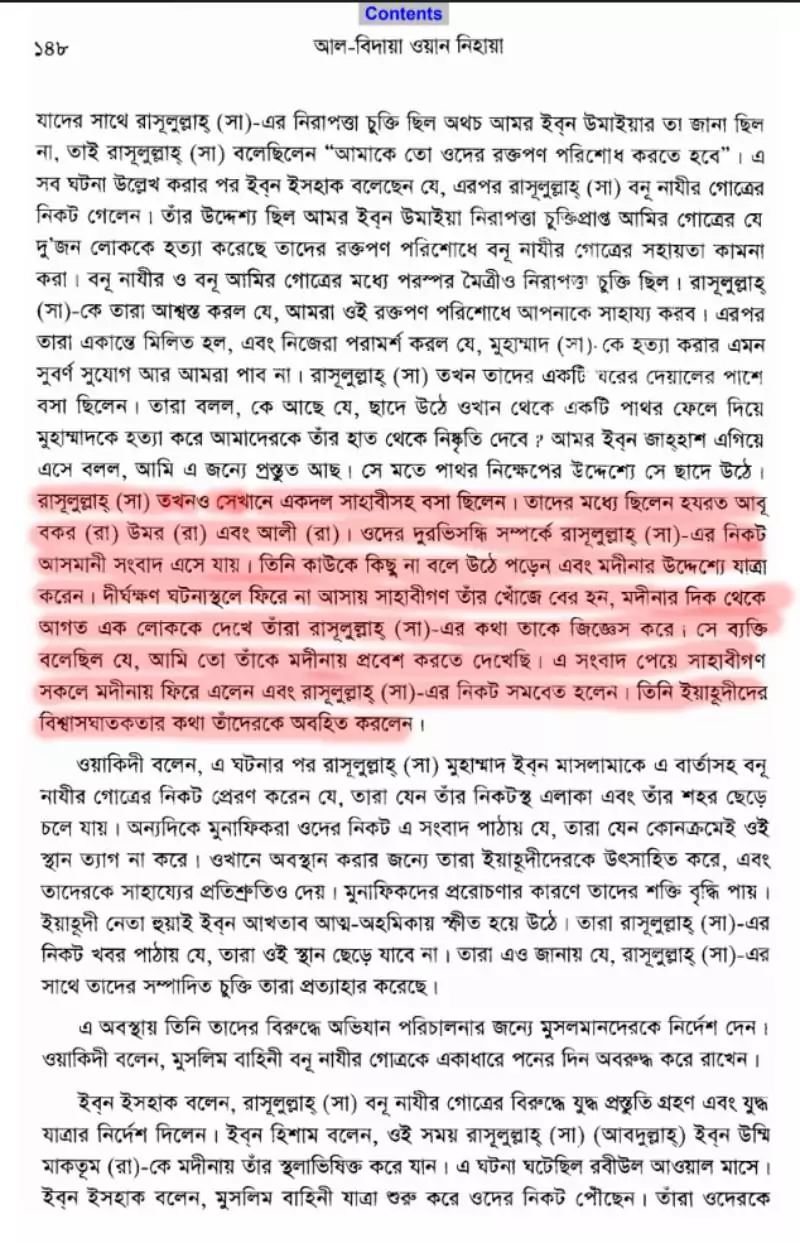
From the above account, we see that Muhammad abruptly left without proving his prophethood. Now let’s see what happened before and after that incident [31]
Sunan Abu Dawud (Islamic Foundation)
Chapter: 14/ Tribute, Spoils, and Rulership
Section: 161. Events of Banu Nadir
Hadith: 2994. Narrated (from Abdur Rahman ibn Ka’b ibn Malik) by a Companion of the Prophet (RA): The disbelievers of Quraysh and Abdullah ibn Ubayy with his polytheist companions from the Aws and Khazraj wrote letters when the Messenger of Allah (ﷺ) was residing in Medina before the Battle of Badr: “You have given shelter to our opponent (Muhammad). We swear by Allah, either you fight him or expel him, otherwise we will attack you all together and kill your warriors and capture your women.” When this news reached the Messenger of Allah (ﷺ), he gathered the Muslims and said to the Jews of Banu Nadir, “You have received a letter from the Quraysh. However, the threat they pose to you is not as serious as what you plan to do to yourselves, for you are resolved to fight against your own children and brothers (i.e., the Muslims among Aws and Khazraj).” When the Jews heard this from the Messenger of Allah (ﷺ), they backed down (from their secret plans). When this news reached the disbelievers of Quraysh (after the Battle of Badr), they wrote to the Jews: “You have wealth and strong fortresses. So you should fight our companion Muhammad (ﷺ). Otherwise we will do such-and-such to you, and there will be no distinction between you and your women (i.e., we will kill you and enslave your women).” When the Jews of Banu Nadir received this letter, they openly rebelled (broke their treaty) and informed the Prophet (ﷺ) that he should come out with thirty of his companions and they would bring out thirty of their scholars, and if those scholars believed in him, then they (the whole tribe) would believe in him.
The next morning, the Messenger of Allah (ﷺ) attacked them with an army and besieged them. He said, “By Allah, you will not be safe unless you promise to leave (Medina).” They refused to agree. So he fought them all day. The next day, he left Banu Nadir and turned to Banu Qurayza, besieging them until they agreed to comply with his demands. Then he returned to Banu Nadir, besieging them again and fighting them until they were forced to surrender and leave the country. The people of Banu Nadir carried whatever they could on their camels—even the doors and frames of their houses. Thus the date orchards of Banu Nadir came under the control of the Messenger of Allah (ﷺ), granted to him specially by Allah…
(the hadith continues, describing how the Prophet distributed the seized wealth among the Muhajirun, etc.)
Hadith grade: Sahih (Authentic)
Narrator: A Companion of the Prophet (RA)
(Summarizing the above: The Prophet avoided the challenge posed by Banu Nadir by abruptly leaving, later claiming a secret assassination plot. Immediately afterwards, he besieged and expelled Banu Nadir, seizing their properties without having to engage in the planned debate. The hadith suggests that when challenged to prove his prophethood, Muhammad chose to attack his challengers rather than convince them in discussion.)
Slander, Abuse, Curses, and Lies
Insulting the religion of his forefathers
Religious people often accuse atheists of insulting and criticizing their religion, of questioning the faith of their forefathers. Did you know Muhammad himself faced the same accusation? After all, Muhammad himself abandoned the religion of his forefathers and insulted those beliefs, which made the pagan Quraysh of his time furious with him. (For the record, I personally don’t consider criticizing religion to be a bad thing—every conscious person should speak out against prevailing superstitions and harmful practices.) But believers consider such disrespect a grave offense—for which their Prophet himself was once accused. See the evidence for yourself [32] –
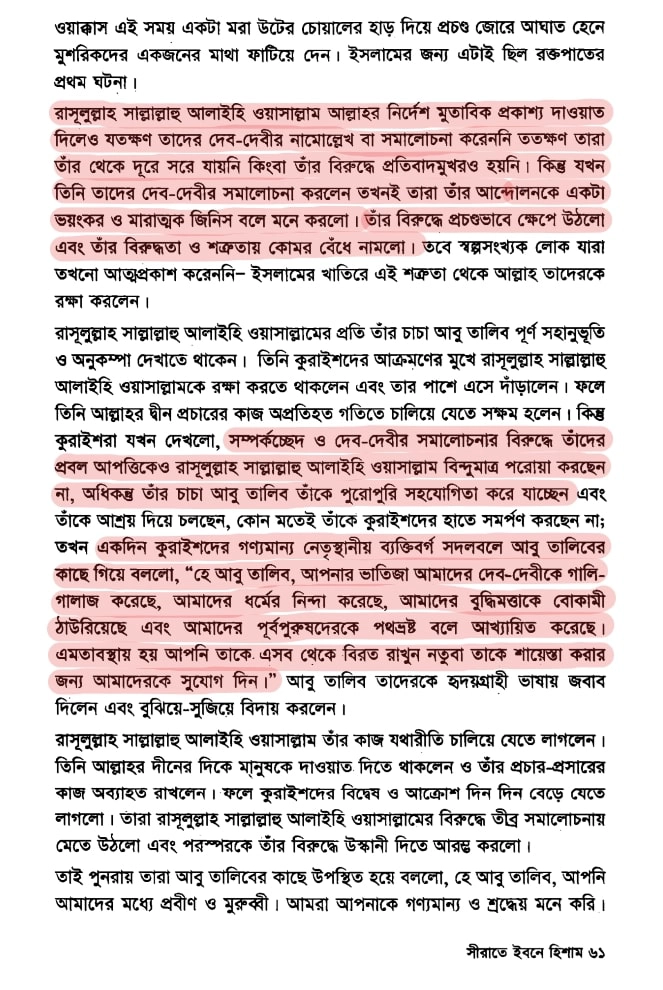
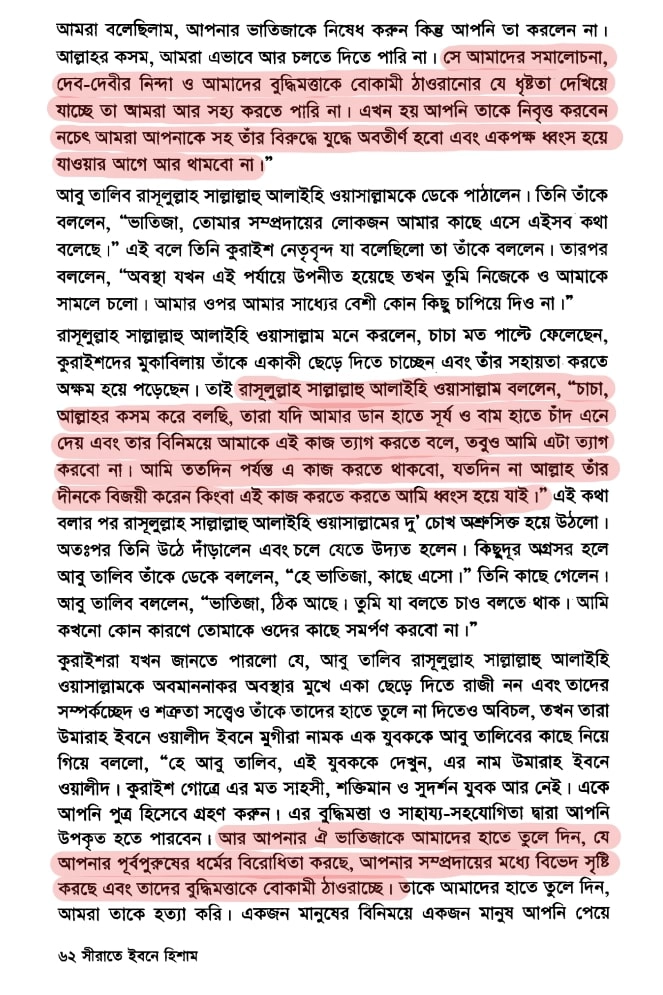
Let’s look at another reference [33] –
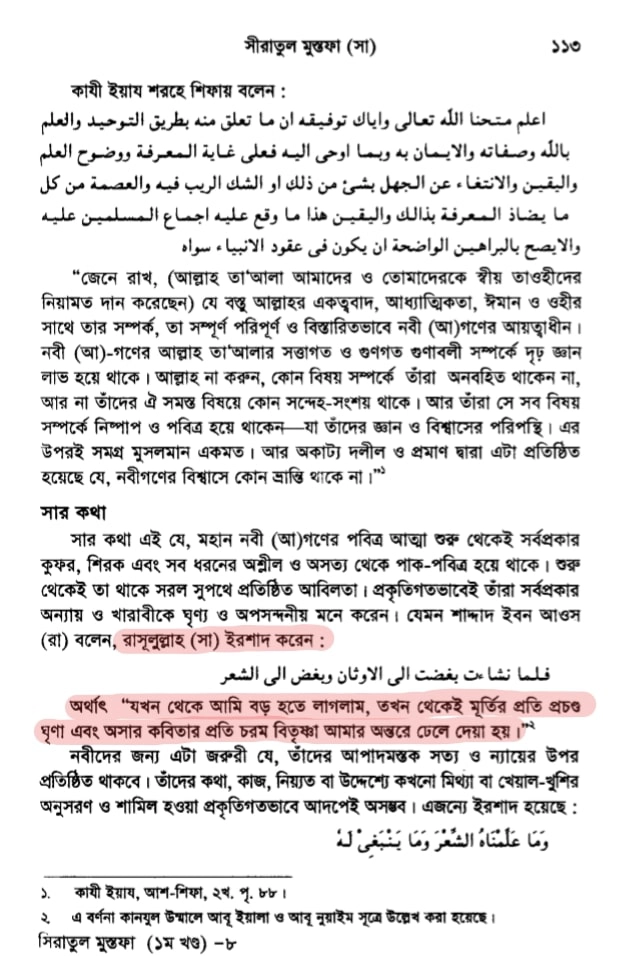
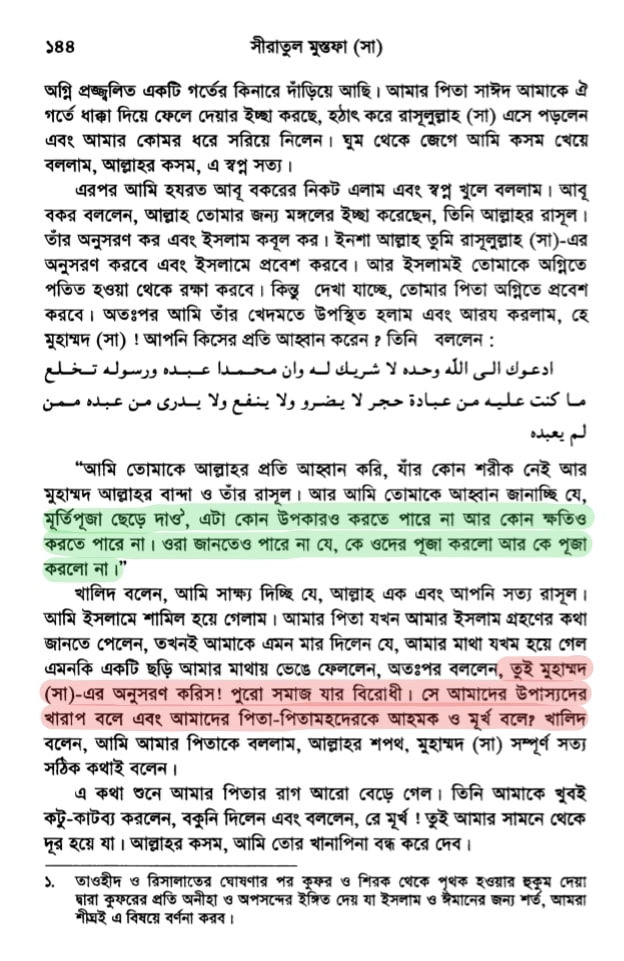
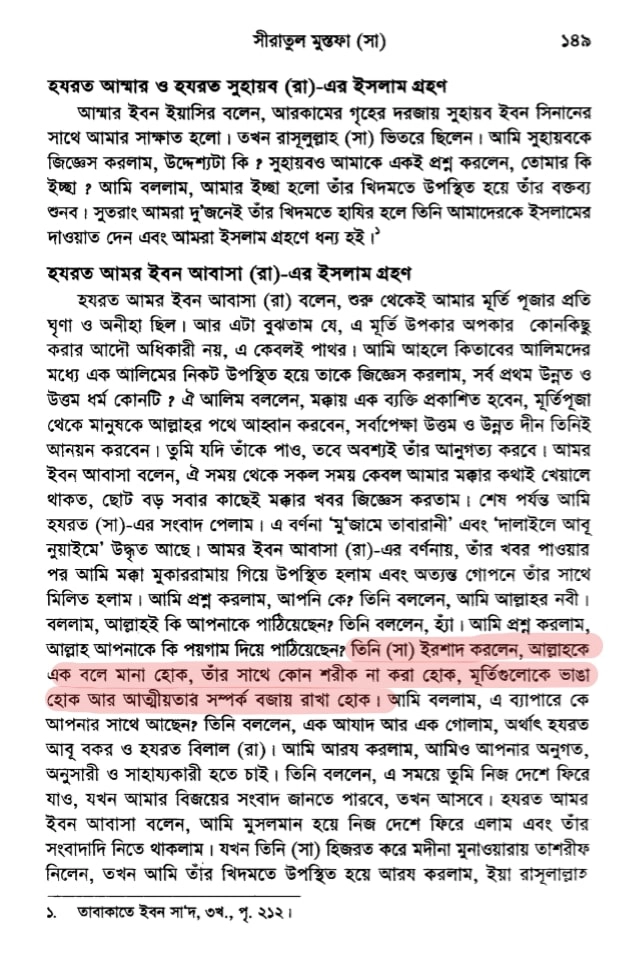
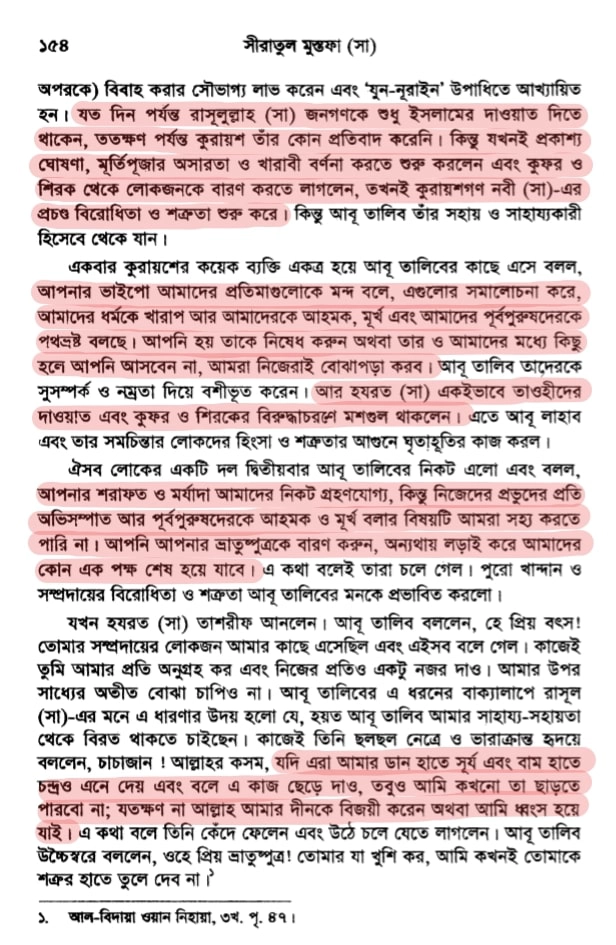
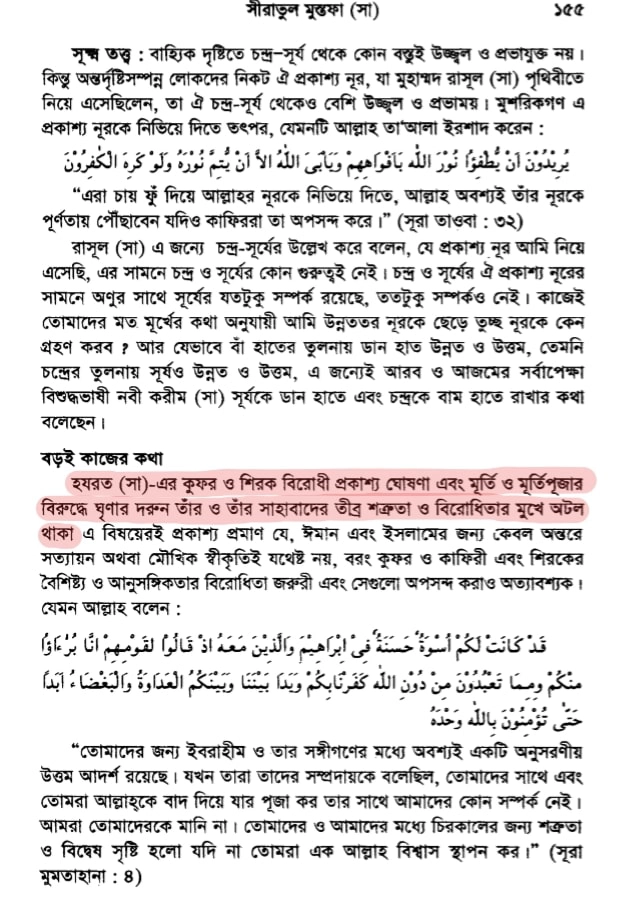
Now let’s consider an excerpt from Ibn Hisham’s Al-Sirah an-Nabawiyyah (The Prophetic Biography). We see that some pagans came and asked the Prophet: “Are you the one who abuses our fathers and grandfathers, who points out the faults of our gods, and who considers the pious and wise among us to be misguided?” The Prophet replied, “Yes, I am that person.” In other words, he admitted to doing all those things. [34] –
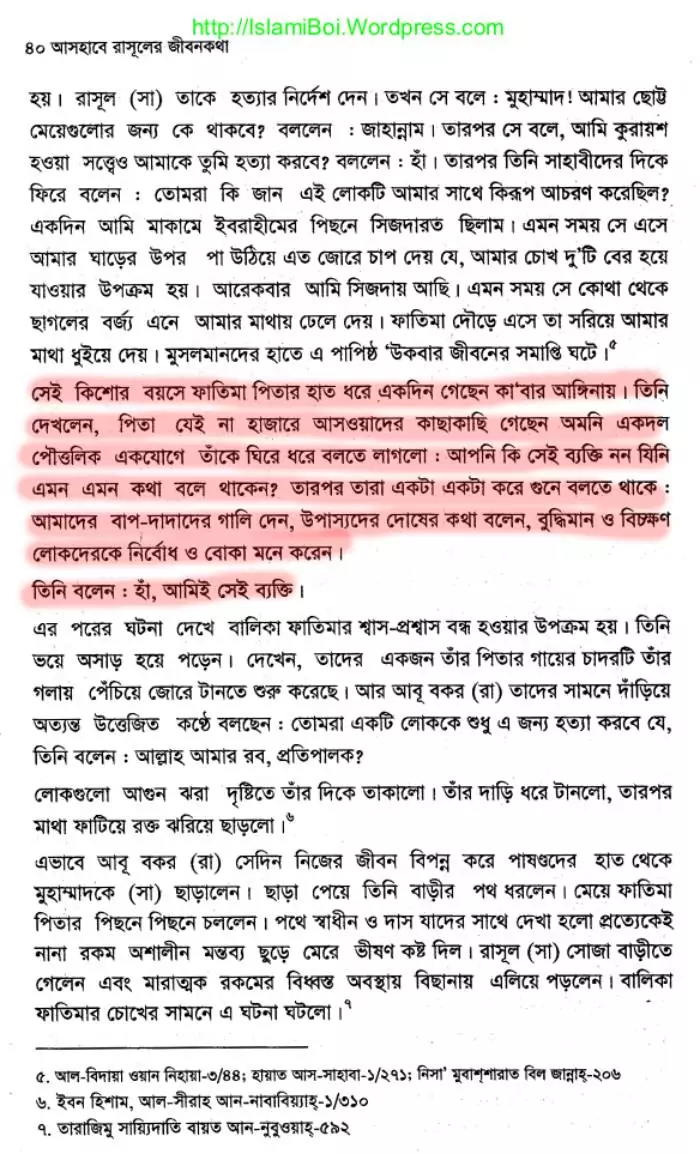
The Prophet cursed the whole community
Famine is a terrible thing. As a civilized person, I cannot even curse my worst enemy with famine. When a famine strikes a region, children die en masse, women and the elderly perish, and even known criminals suffer along with the innocent. I would never wish for anyone to die of starvation. But the Prophet used to invoke famine as a curse on an entire tribe—something that would kill children, women, the disabled, and the elderly alike! [35]
Sahih Bukhari (Islamic Foundation)
Chapter: 15/ Invoking Allah for rain (Istisqa)
Section: 636. The Prophet’s supplication of famine (like the years of Yusuf) upon a people.
Hadith: 952. Narrated Abu Huraira (RA): When the Prophet (ﷺ) raised his head from the last rak’ah (of Fajr prayer), he said, “O Allah! Rescue Ayyash ibn Abi Rabi’ah. O Allah! Rescue Salama ibn Hisham. O Allah! Protect al-Walid ibn al-Walid. O Allah! Rescue the weak believers. O Allah! Intensify Your punishment on the tribe of Mudar. O Allah! Impose upon them years (of famine) like the years of Yusuf (Joseph).” The Prophet (ﷺ) also said, “(As for the) Ghifar (tribe) – may Allah forgive them. And (for the) Aslam (tribe) – may Allah keep them safe.” Ibn Abi Zinad (RA) said from his father: All these supplications were made in the Fajr prayer.
Hadith grade: Sahih (Authentic)
Narrator: Abu Huraira (RA)
The Promise-Breaking, Lying Prophet
Muhammad was a liar and a promise-breaker. But he very cleverly put the responsibility for breaking his promises on Allah, and continued these misdeeds as if they were commanded by God. Direct evidence of this is found in a Sahih Bukhari hadith. In the hadith below, it is stated that if someone makes a promise, but later considers its opposite to be better, he can do the opposite as long as he offers expiation for the oath. So many blatant lies and broken promises – is everything forgiven just by paying expiation? [36]
Sahih Bukhari (Tawheed)
Chapter: 93/ Laws and Rulings (Ahkam)
Section: 93/6. Whoever aspires to leadership…
Hadith: 7147. Narrated Abdur Rahman ibn Samurah (RA): The Prophet (ﷺ) said to me: “O Abdur Rahman ibn Samurah, do not seek leadership. If you are given it by asking, you will be left alone (without divine help); but if you are given it without asking, you will be divinely assisted. And if you take an oath to do something and later find that something else is better, then do what is better and expiate your oath.”
Hadith grade: Sahih (Authentic)
Narrator: Abdur Rahman ibn Samurah (RA)
Not only that, the Prophet himself practiced this. If he made a promise but later thought the opposite course was better or more beneficial, he would simply break the promise after performing some expiation — i.e., he would violate the promise [37].
Sahih Bukhari (Islamic Foundation)
Chapter: 59/ Sacrifice (Slaughtering) and Hunting
Section: 2192. Eating rooster meat.
Hadith: 5121. Narrated Abu Musa al-Ash’ari (RA): He said, I saw the Prophet (ﷺ) eating chicken meat. [Another chain:] Narrated Jahdam (RA): He said, We were with Abu Musa al-Ash’ari (RA) – our tribe of Jarm had a pact of brotherhood with him – and food was brought which contained rooster meat. There was a red-haired man among us who held back from the food. Abu Musa said: “Come and eat, for I saw the Prophet (ﷺ) eat rooster meat.” The man said: “I saw it (the rooster) eating something (dirty), so I swore I would never eat it.” Abu Musa said: “Come, I will tell you (a hadith about that).”
He continued: I came with a group of Ash’ari people to the Prophet (ﷺ), and we asked him for mounts (animals to ride). He was angry and said, “By Allah, I will not give you mounts. I have nothing to give you to ride.” Then some war booty of camels was brought to the Messenger of Allah (ﷺ). He said: “Where are those Ash’aris? Where are those Ash’aris?” Abu Musa said: So he gave us five white strong camels. We went away for a distance, and then I said to my companions, “The Messenger of Allah (ﷺ) has forgotten his oath. By Allah, if we leave and he doesn’t remember his oath, we will never succeed.” So we went back to the Prophet (ﷺ) and said, “O Messenger of Allah, you swore not to give us mounts when we asked you, yet you have given us mounts.” Thereupon the Prophet (ﷺ) said: “Allah has given you mounts. By Allah, if I ever swear to do something and later see that something else is better, I do that which is better and expiate my oath.”
Hadith grade: Sahih (Authentic)
Narrator: Abu Musa al-Ash’ari (RA)
Allowing to lie
Prophet Muhammad once sent a companion to kill an enemy, and he gave him permission to use deception (to lie) in order to accomplish it. The original hadith is provided elsewhere; here the incident is explained in a hadith commentary [38].
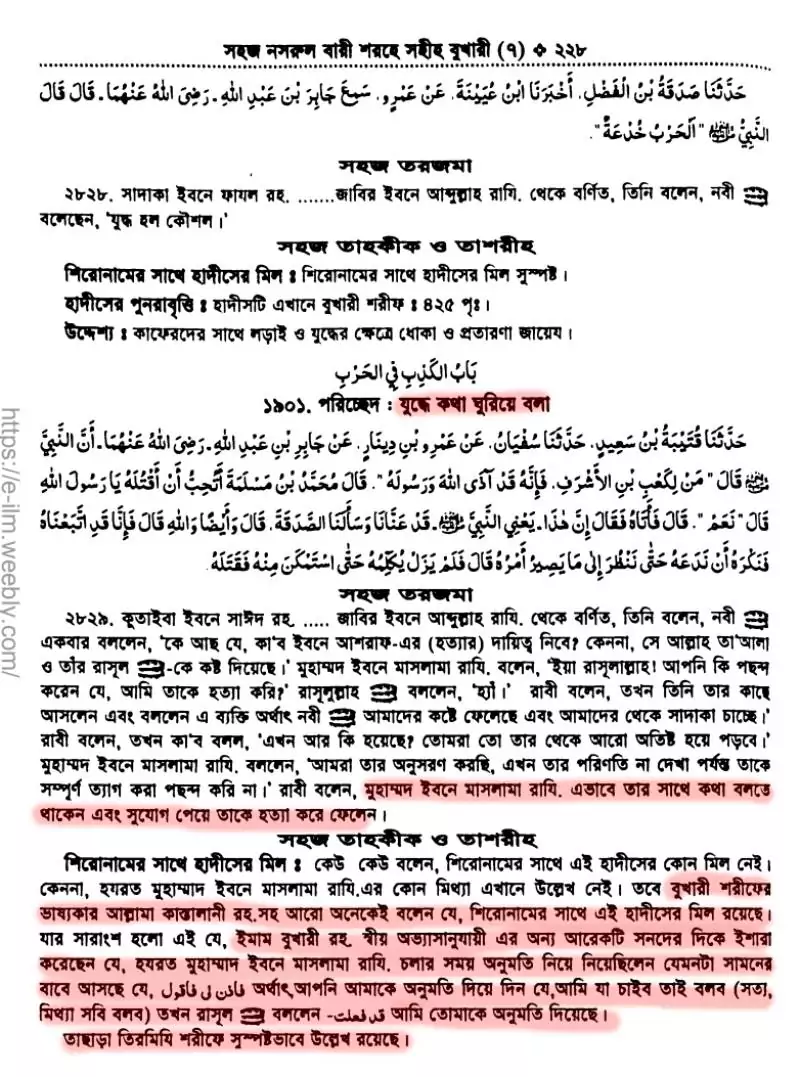
The Prophet used to give bribes for preaching religion
Prophet Muhammad would offer disbelievers wealth and spoils of war as bribes to attract them to Islam. He openly said that non-Muslims could be won over to Islam if they were given wealth, and he gave them money for this purpose. This is seen in Tafsir Ibn Kathir [39] –
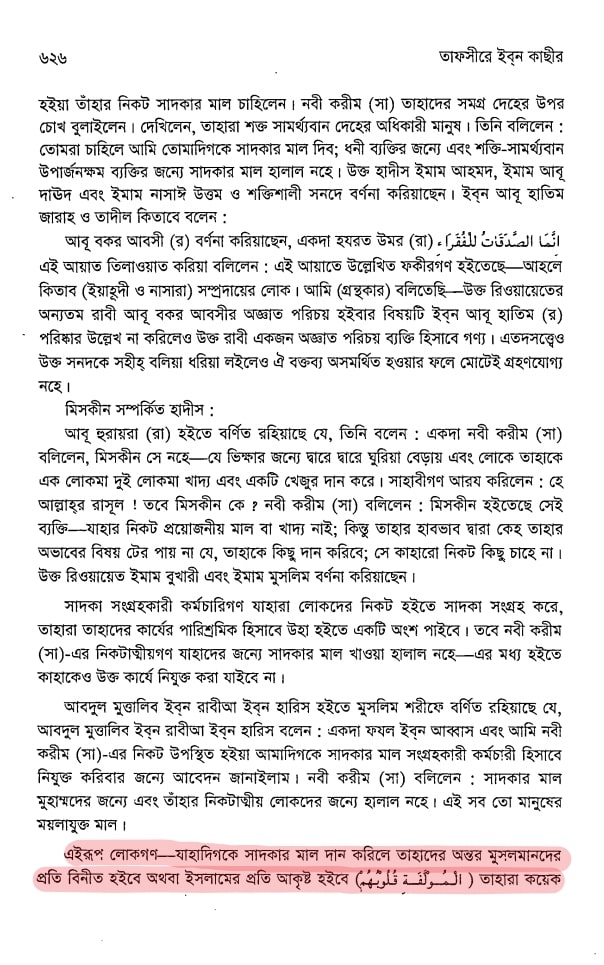
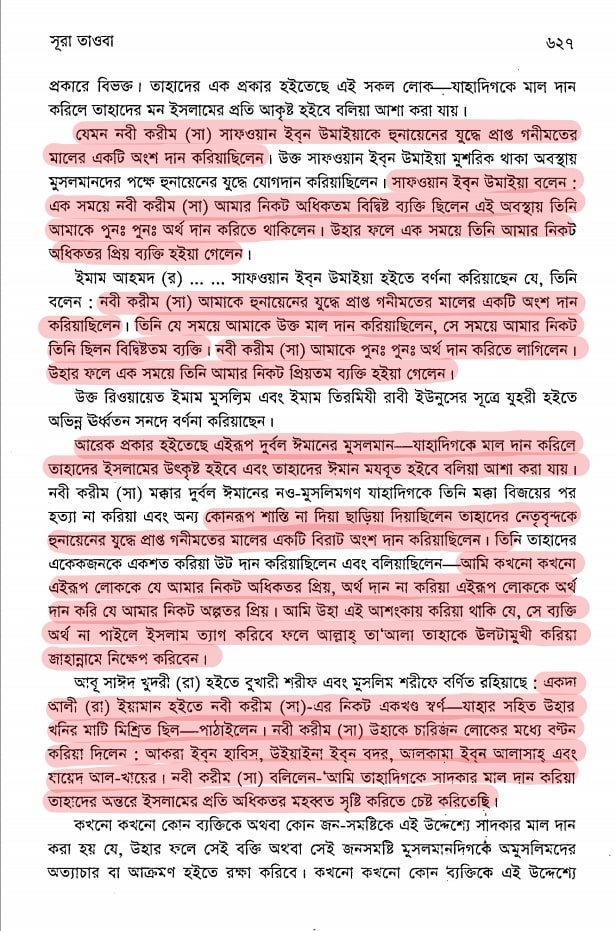
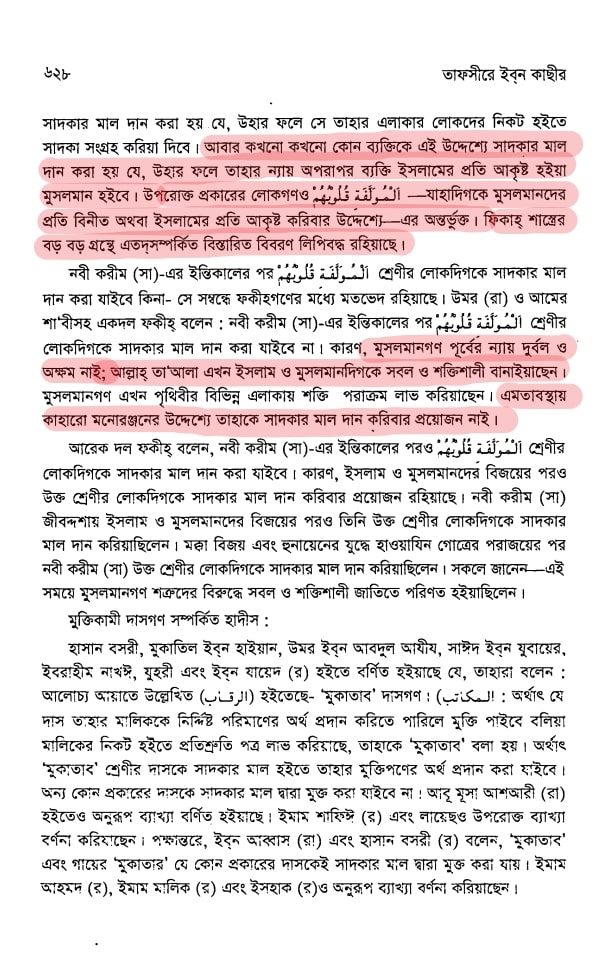
This policy is evident during the distribution of war booty after the Battle of Hunayn, where the Prophet gave large shares to recent converts (the “Muallafa Qulub,” or those whose hearts were to be reconciled) to strengthen their inclination towards Islam. Such behavior essentially amounts to bribery in the name of religion, raising moral questions about the Prophet’s methods of proselytization.
(We have seen, step by step, many aspects of Prophet Muhammad’s life that conflict with the claim of him being “the greatest of all time.” From instructing followers to love him above all, to praising himself, acting contradictorily, failing prophecies, using harsh curses, breaking promises, permitting lies, and resorting to bribery—these traits and actions are difficult to reconcile with the image of an ideal, exemplary human. Ultimately, it is up to the reader to decide, in light of authentic sources, whether Muhammad truly stands as the greatest person of all time.)
References
- Sahih Bukhari, Tawheed Publications, Hadith: 14 ↩︎
- Sunan At-Tirmidhi (authenticated), Tahqiq by Nasiruddin Albani, Hussain Al-Madani Publications, Volume VI, Hadith: 3895 ↩︎
- Qur’an 66:5 ↩︎
- Behind the threat of divorce of the Prophet’s wives ↩︎
- Sahih Bukhari, Islamic Foundation, Hadith: 4850 ↩︎
- Sahih Bukhari, Islamic Foundation, Volume 8, pp. 490-491 ↩︎
- Bukhari Sharif, Bengali Translation and Explanation, Volume 6, Page 229 ↩︎
- Al-Lu’lu wal Marjan, Hadith No. 1592 ↩︎
- Tafseer Ibn Kasir, Islamic Foundation, Volume 9, Pages 136-137 ↩︎
- Sunan At-Tirmidhi (authenticated), Hadith No. 9 ↩︎
- Mishkatul Masabih, Hadith Number: 364 ↩︎
- Sahih Shamā’il Tirmidhi, Hadith Number: 126 ↩︎
- Sunan Ad-Dārimi, Hadith Number: 45 ↩︎
- Al-Bidaya wa’n-Nihaya, Volume II, Islamic Foundation Bangladesh, Pages 39, 40 ↩︎
- Sahih Bukhari, Tawheed Publications, Hadith Number: 2885 ↩︎
- Sahih Muslim, Islamic Foundation, Hadith Number: 4490 ↩︎
- Sahih Bukhari, Islamic Foundation, Hadith Number: 5320 ↩︎
- Sahih Bukhari, Islamic Foundation, Hadith No. 6965 ↩︎
- Sahih Bukhari, Islamic Foundation, Hadith No. 2467 ↩︎
- Sahih Muslim, Islamic Foundation, Hadith Number: 7140 ↩︎
- Sahih Muslim, Islamic Foundation, Hadith No. 7142 ↩︎
- Sahih Muslim, Islamic Foundation, Hadith Number: 5915 ↩︎
- Sahih Muslim, Islamic Foundation, Hadith Number: 5916 ↩︎
- Sahih Bukhari, Tawheed Publication, Hadith No. 5684 ↩︎
- Sunan Abu Dawud, Islamic Foundation, Hadith No. 3607 ↩︎
- Sahih Muslim, Hadith Academy, Hadith No. 7251 ↩︎
- Mishkatul Masabih, Hadith No. 5474 ↩︎
- Tafseer Mazhari, Hakimabad Khankaye Mojaddedia Publications, Volume 7, Pages 204-205 ↩︎
- Tafseer Mazhari, Hakimabad Khankaye Mojaddedia Publications, Vol. 4, Page 281 ↩︎
- Al Bidaya wa’n-Nihaya, Islamic Foundation, Vol. IV, Page 148 ↩︎
- Sunan Abu Dawud, Islamic Foundation, Hadith Number: 2994 ↩︎
- Sirat Ibn Hisham: Biography of Prophet Muhammad (ﷺ) by Akram Faruq, pp. 61, 62 ↩︎
- Siratul Mustafa ﷺ by Allama Idris Kandhalvi (r.a.), Islamic Foundation Bangladesh, Volume 1, pages 113, 144, 149, 154, 155 ↩︎
- Al-Sirah an-Nabawiyyah, Ibn Hisham, Vol. VI, p. 40 ↩︎
- Sahih Bukhari, Islamic Foundation, Hadith Number: 952 ↩︎
- Sahih Bukhari, Tawheed Publications, Hadith Number: 7147 ↩︎
- Sahih Bukhari, Islamic Foundation, Hadith No. 5121 ↩︎
- Nasr al-Bari (Simple), Sharh Sahih Bukhari, Arabic-Bengali, plain translation with interpretation by Hazrat Maulana Usman Gani, Al Kausar Publications, Volume 7, Page 228 ↩︎
- Islamic Foundation, Volume IV, Pages 626-628 ↩︎

